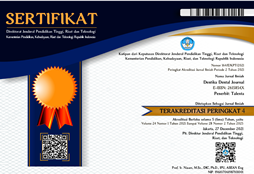THE POTENTIAL OF HEDYOTIS CORYMBOSA (L.) LAMK EXTRACT TO INHIBIT THE PROGRESSIVITY OF ORAL CANCER CELL IN RATS INDUCED WITH BENZOPYRENE
DOI:
https://doi.org/10.32734/dentika.v19i1.142Keywords:
heydotis corymbosa (L.) Lamk, oral cancer, apoptosis, benzopyreneAbstract
Cancer is still ranked as the fifth cause of mortality and morbidityin Indonesia.Hedyotis corymbosa (L.) Lamk has ursolat acid as anti-proliferative cancer cell. This research is aimed to determine the potency of Hedyotis corymbosa (L.) Lamk at different doses, namely 375, 750, and 1500 mg/kg, used as an inhibitor for the progressivity of oral cancer, such as proliferation, angiogenesis, and apoptosis of cancer cells. Post test only control group design was used in this research. There were 24 Rattus novergicus used as research samples. Those were divided into four groups, namely control, treatment group 1 with a dose of 375mg/kg, treatment group 2 with a dose of 750 mg/kg, and treatment group 3 with a dose of 1500mg/kg. Their oral cavity was induced intramusculary by benzopyrene with a dose of 8mg/kg for 4 weeks (twice a week) to create cancer. Hedyotis corymbosa (L.) Lamk was given orally for 10 days. All samples were aclimatitation to perform Histo Pathology Anatomi among groups. Haematoxillin Eosin for proliferation cancer cell and capilary. Immunohistochemistry for expression of caspase3. Data were tabulated andanalyzed statistically by ANOVA. There was significant difference of cancer cell proliferation and capilary between control and treatment groups. The most significant decreasing of cancer cell proliferation was in those samples given with a dose of 750 mg/kg. Meanwhile, the highest apoptosis of caspase3 expression was in those samples given with a dose of 750 mg/kg. It can be concluded that Hedyotis corymbosa (L.) Lamk extract could decrease cancer cell proliferation and capilary as well as could increase apoptosis.
















